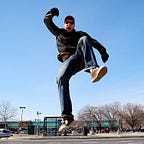9/11 +20
In retrospect, there were three calamities intertwined in my memory of 9/11. We are all keenly aware of the first: the horrifying attacks perpetrated by al-Qaeda against American centers of power. (I cannot do justice here to the memory of those ghoulish hours and the lives lost; I am grateful to those who were there and those who have done the hard work of exploring and revisiting that day.) The other two threads unspooled over the following weeks, months, and years, as both agitated individuals and calculating political figures drew on misplaced aggression to respond to the attacks by targeting perceived enemies within our own borders.
Even before the dust settled from the Twin Towers and the Pentagon, the second-order aftershocks were already emerging. Most of us were overcome by horror, bewilderment, and a yearning for unity, but we cannot ignore those who sought a twisted vengeance. Many people took it upon themselves to respond by narrowing the definition of who counted as “American” and strike out against those who didn’t fit their vision. In echoes of the attacks against Black Americans in the Reconstruction era or against Japanese-Americans after Pearl Harbor, vigilantes seeking “revenge” committed a slew of hate crimes again anyone they believed even loosely resembled the hijackers. I have friends of South Asian ancestry who can still vividly recount being confronted angrily on the street or nearly run off the highway in those heated days, but they were fortunate enough to escape physically unharmed. Others were not. Indeed: the iconic victims of 9/11 must include not only heroes like Mark Bingham, but ordinary people like Balbir Singh Sodhi, a Sikh man living in Arizona who was shot on September 15, 2001, by one such vigilante while planting flowers outside his shop.
While much of the retributive violence following the attacks came from the street level, we also saw less-visceral but still-chilling responses coming from official channels. The ensuing years saw a third mutation of 9/11 via its weaponization into a political cudgel; some in Washington used our collective grief as cover to push the idea that dissent was unpatriotic, and that free speech should be more highly regulated or confined to obscure zones. Civil liberties were expected to take a backseat to a nebulous and rapid expansion of the state around the homeland security enterprise. Despite our ballyhooed international moral standing, the use of torture against POWs was somehow an open matter for public debate. America had so much goodwill and we squandered it.
There are few if any straight lines in history, whether personal or global. Sometimes a single event can have reverberations that work at cross-purposes; I can say with some confidence that the confusion and chaos of 9/11 both pushed me toward and away from public service. Wanting to make sense of it all — “it all” largely being the forces that led to our national sense of security being shattered — I quit my job and moved to DC in 2003 to study international relations. Living in the capital and seeing the aggressively jingoist politics of that era up close, however, it felt difficult if not impossible to see a space for myself anywhere in that world, much less within the homeland security apparatus.
As more disasters befell us, from Hurricane Katrina to the Financial Crisis, it became more possible to put the enormity of 9/11 into a bigger context, sad and somber as it was. After spending six years in the relatively anodyne world of transportation safety, I made the leap in 2014 to begin exploring a topic that had fascinated me when I was younger: the thorny world of immigration. At times I struggled to make sense of why USCIS was even in the Department of Homeland Security, but over these years I have come to appreciate the delicate duality of its mandate. We both oversee a doorway to the promise of freedom in America for people seeking a better life — as many have before them — and guard the last gate against risks to our national security. It is an ambivalent role, but it befits an agency born out of an event with a complicated legacy. While we commemorate the grievous losses visited upon us by an external threat to the nation, 9/11 exposed painful vulnerabilities both outside and within.
